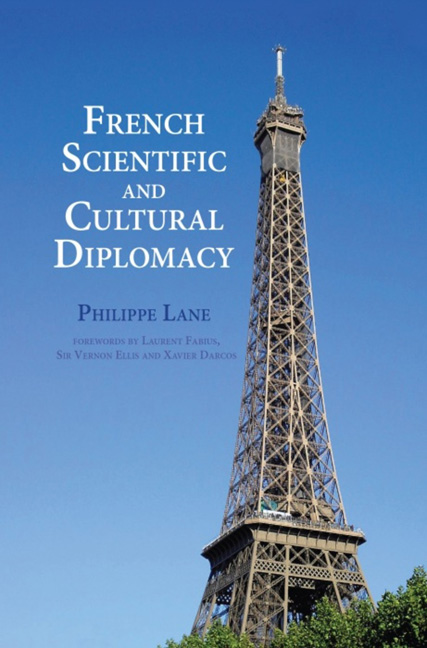Book contents
- Frontmatter
- Contents
- List of Tables
- List of Abbreviations
- Acknowledgements
- Foreword
- Foreword
- Foreword
- Introduction
- 1 French Foreign Cultural Activities: A Tradition with a Long History
- 2 Cultural and Scientific Action since 1995: Soft Power or Hard Power?
- 3 The Protagonists of Cultural and Scientific Diplomacy; 2011: A New Start
- 4 Cultural Diplomacy and the Arts
- 5 Science and University Diplomacy
- 6 Linguistic and Educational Cooperation
- 7 The Organization and Implementation of French Cultural and Scientific Activities Abroad
- Conclusion
- Index
Conclusion
- Frontmatter
- Contents
- List of Tables
- List of Abbreviations
- Acknowledgements
- Foreword
- Foreword
- Foreword
- Introduction
- 1 French Foreign Cultural Activities: A Tradition with a Long History
- 2 Cultural and Scientific Action since 1995: Soft Power or Hard Power?
- 3 The Protagonists of Cultural and Scientific Diplomacy; 2011: A New Start
- 4 Cultural Diplomacy and the Arts
- 5 Science and University Diplomacy
- 6 Linguistic and Educational Cooperation
- 7 The Organization and Implementation of French Cultural and Scientific Activities Abroad
- Conclusion
- Index
Summary
Between the Juppé and Schweitzer White Paper reasserting the necessity for a global cultural and scientific network and the general review of public policies implying a reduction of activity, the cultural and scientific initiatives of France must be undertaken in a context of declining staff numbers and dwindling state finance.
France has set up a classification of its embassies, scheduled to have been finalized by the end of 2011. The premier category is ‘embassies with extended roles’, with a remit to cover the whole range of diplomatic activities, such as defence, culture, economy, security and sounding political alerts; a second category is ‘with priority roles’, which will be required to prioritize some activities, at the expense of others that will be allowed to lapse; a third category ‘with specific powers’ will result in a reduced French presence. This evolution will have consequences for the organization of work and of the services provided.
This context, which is not unique to France, specifies the priority areas and where to develop partnerships and co-funding, public and private. This evolution necessitates exploiting the synergies between ministries and state links with business and civil society. Notable is the role of the Foreign Office, the Quai d'Orsay, in partnership with the Ministère de la Culture et de l'Education nationale and the Ministère de l'Enseignement supérieur et de la Recherche, as stated by three French ambassadors, each a former general secretary to the Quai d'Orsay from 1998 to 2002:
Having a strong Ministry of Foreign Affairs is now vital. The two former ministers, who have given their opinion, had each in turn tried to raise public awareness on this. The White Paper on French foreign policy, directed by Alain Juppé and Louis Schweitzer, already identified the paradox of having ‘on one side a competitive world, fragmented, dangerous, and particularly exacting for our efforts abroad, and on the other side a Ministry of European and Foreign Affairs with ever diminishing resources’.
- Type
- Chapter
- Information
- French Scientific and Cultural Diplomacy , pp. 117 - 120Publisher: Liverpool University PressPrint publication year: 2013

